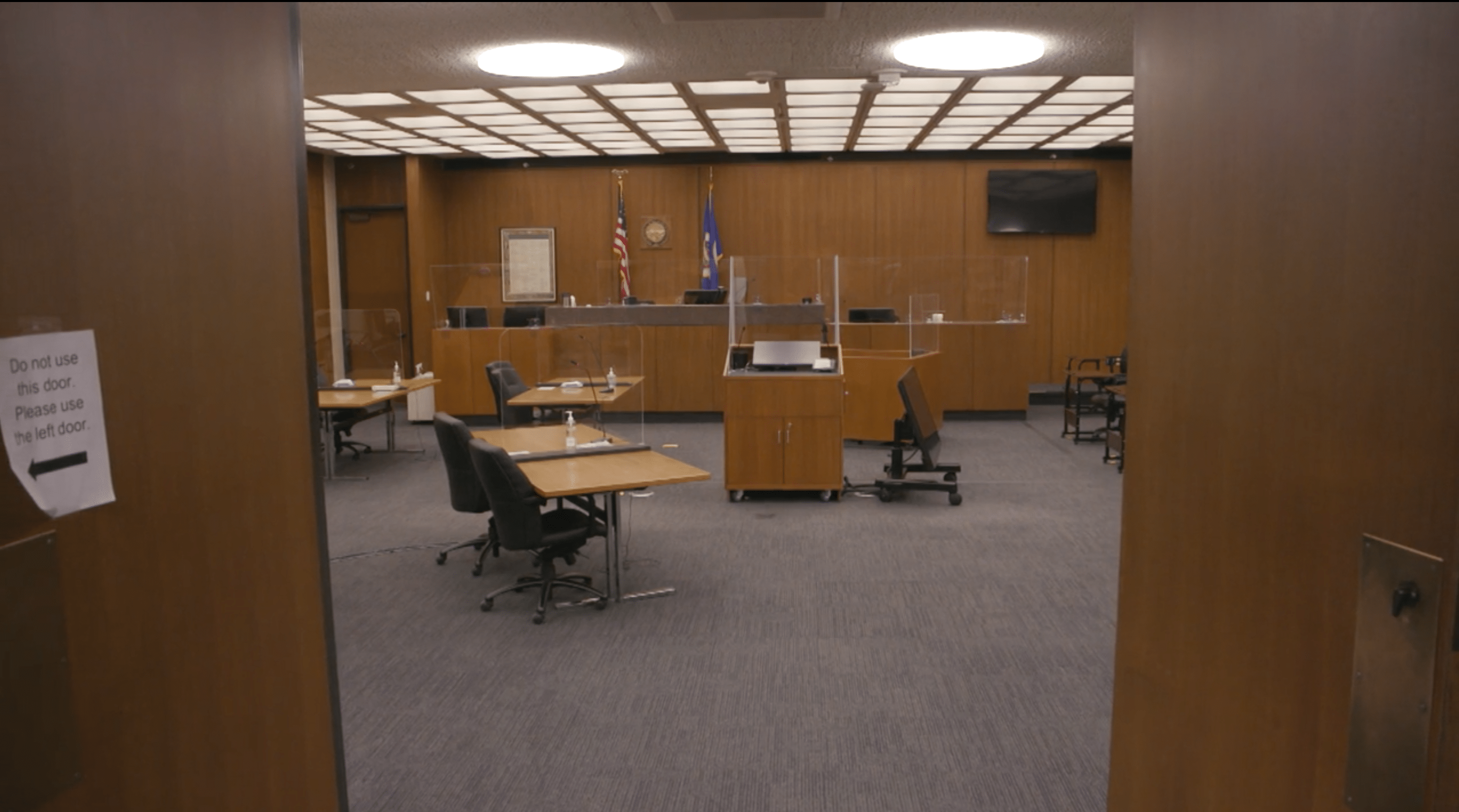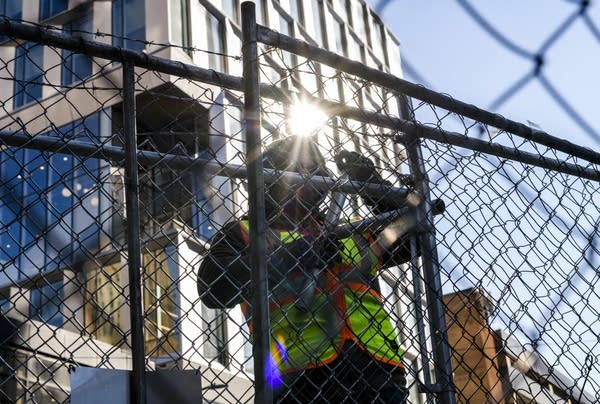Chauvin trial: 3 jurors now seated; appeals court ruling looms
Court adjourned for Day 2 of the trial

Go Deeper.
Create an account or log in to save stories.
Like this?
Thanks for liking this story! We have added it to a list of your favorite stories.
MPR News will stream live coverage of the trial on Facebook beginning at 8 a.m. Some images or material discussed during the proceedings will be disturbing to many viewers. Watch here:
3 things to know:
3rd juror seated; 22 dismissed
In-court remarks by defense suggest financial discussions between Minneapolis, Floyd family
Still unclear if an unresolved matter on the reinstatement of third-degree murder charges will delay proceedings
Updated 6:06 p.m.
Three jurors were chosen Tuesday for the trial of Derek Chauvin, the ex-Minneapolis police officer facing charges of murder and manslaughter in the killing of George Floyd.
One is a chemist and environmental studies scientist who said he typically views life through an analytical lens.
Another juror described herself as easygoing, and a mediator among her friends. She has an uncle who’s a police officer in central Minnesota, but said that wouldn't affect her opinion. When the judge told her she was chosen, she said "awesome."
Turn Up Your Support
MPR News helps you turn down the noise and build shared understanding. Turn up your support for this public resource and keep trusted journalism accessible to all.
A third juror was picked just prior to the end of a long, slow day of motions and questions.
The three jurors seated Tuesday appear to include two white men and one woman of color.
Judge Peter Cahill expects opening statements for the trial on March 29, although it’s still unclear if proceedings will be delayed by an unresolved matter on the reinstatement of third-degree murder charges.
At one point Tuesday, in-court remarks by the defense suggested there have been financial discussions between Minneapolis and the Floyd family.
Questions of bias
The defense used one of its strikes on Tuesday to dismiss the first potential juror who was questioned in the morning. The woman described herself as being originally from Mexico and said she had problems with English.
But Cahill decided while he didn’t think her not being a native English speaker was a problem, he agreed that she may have trouble following the trial and allowed her to be struck.
A third potential juror questioned was excused after she said she had "strong opinions" about the case and didn’t know if she could be impartial.
Later in the day, prosecutor Steve Schleicher raised questions of bias on the part of defense attorneys, given that they had dismissed two jurors self-identified as Hispanic.
Defense attorney Eric Nelson denied any bias. Beyond the woman who said she was originally from Mexico and had some problems with English, Nelson said the second potential juror was struck because the man’s martial training led him to believe Chauvin used an “illegal” move when he pinned Floyd to the road.
Nelson also said he didn’t think that juror was sincere in his statement that he could be convinced otherwise if evidence contradicted his opinions.
Cahill said Nelson provided a “race neutral” explanation for the strikes.
Attorneys quizzed jurors about their knowledge of Floyd’s killing, as well as their opinions on movements like Black Lives Matter and Blue Lives Matter. Attorneys also asked about their experiences with police officers and the court system, as well as their thoughts on people who use illegal drugs.
Six potential jurors were stricken from the pool in total Tuesday. Prosecutors used one of their strikes on a man who said he believed that police officers had difficult jobs and that people shouldn’t second-guess them. Other jurors were released after saying that security at the court building was intimidating or that they feared retaliation for their involvement with the case.
A 19-year-old who was later struck by the judge told attorneys that he believed the Minneapolis Police Department has a history of corruption, that they “get away with many things,” and that he believes police are “trying to do the best they can not to get their police department defunded.”

Earlier in the day, a motions hearing was held detailing arguments about which evidence will be allowed.
The defense argued that Minneapolis police Chief Medaria Arradondo’s decision to fire Chauvin was biased and based on concerns from the African American community.
Prosecutor Jerry Blackwell countered that it’s not relevant to the trial that Chauvin was fired. He said whether or not Chauvin's use of force was appropriate is up to the jury to decide.
Cahill agreed with the state. Only mentions of Chauvin employment dates will be allowed.
Cahill also ruled that an off-duty Minneapolis firefighter who was at the scene of the struggle cannot testify that she or someone else could have saved Floyd’s life if they’d been allowed to intervene.
“[That] is a medical testimony that she does not have the expertise — since she doesn’t know all the other factors that are going into that,” said Cahill. “But she can say almost everything right up to that.”
‘Every life should matter equally’
Earlier in the day, Nelson asked the first juror chosen to expand on some of the answers he gave on his written questionnaire, particularly a question concerning Black Lives Matter.
“I support the message that every life should matter equally,” the juror said. “I don’t believe that the organization Black Lives Matter necessarily stands for that.”
The juror was also asked to expand on answers he gave about disparities in policing and about the criminal justice system. He said he doesn’t necessarily think Minneapolis police are more likely to use force against Black people than they would against others.
However, he said he believes the criminal justice system is biased against racial and ethnic minorities. He said there was a lot of evidence to support that opinion.
Court is scheduled to resume on Wednesday morning at 8 a.m. An appeals court decision tied to prosecutors’ effort to reinstate third-degree murder charges could still lead to delays with the trial. The court is expediting its decision in that case.
You can watch a recording of Tuesday morning’s proceedings here.
Day 1: Jury pool sent home
The trial stalled Monday morning, its first day, after Cahill sent potential jurors home while a lingering debate continued over a key matter. At issue is the possible reinstatement of a third-degree murder charge against Chauvin in the killing of George Floyd. The appeals court on Friday ordered Cahill to consider adding the charge, which he’d previously dismissed. Chauvin’s attorneys are appealing that decision to the state Supreme Court, which on Tuesday confirmed it has received the petition to review of the appeals court order. State prosecutors have until the end of the day to file a response.
Prosecutors argue that moving ahead with jury selection while the appeal is being considered could be a problem. Matthew Frank, an assistant state attorney general, told the court on Monday that prosecutors were concerned proceeding now could lead to a reversal of a conviction later on.
“This court would be making decisions about jurors for a trial about which we don’t know what the exact charges are going to be yet,” Frank said. Prosecutors also expressed concern the appeal and its responses could take months to resolve.
Nelson argued the court could take up limited motions and jury selection despite the appeal.
Much of Monday went to housekeeping motions governing the trial, including evidence and witness subpoenas.
Among the decisions made, prosecutors and defense attorneys:
Struck 16 potential jurors based on the questionnaires they filled out.
Agreed that witnesses will not be allowed to watch the trial’s livestream after they've testified in case they're called back in. (This does not apply to expert witnesses.)
Agreed that wording like "the victim" or "the accused" may not be used — though the judge said he would not “micromanage” the language. Testimony of guilt or innocence is not allowed, either.
Prosecution agreed it won't introduce evidence from a private autopsy conducted by Floyd's family.
Judge and prosecution agree to prevent “any expert from likening the death of George Floyd to the crucifixion of Jesus Christ on the ground that such analogy is prejudicial."
Nelson on Monday again argued to allow a 2019 arrest of Floyd into evidence, alleging that Floyd ingested drugs when police approached him then. He said the cause of death and whether drugs contributed to it will come up during this trial.
Cahill, however, said he was not convinced of its relevance because Chauvin was not involved in the earlier arrest nor did he have any knowledge of it.
George Floyd's sister Bridgett Floyd described the first day of the trial as an emotional roller coaster but said her family is relieved the trial has begun.

"I will say that my family and I are glad the wait is finally over and the day is here,” she told a large gaggle of local, national and international media outside the Hennepin County Courthouse Monday.
"We are praying for justice. Our hope is that justice prevails and we can all use this as an opportunity to be better and do better for those around us."
Because of COVID-19, only one family member is allowed in court per day from the Floyd family and for the defendant. Bridgett Floyd thanked supporters and asked for continued prayers for the Floyd family. She refrained from talking about the trial itself.
Chauvin faces charges of second-degree unintentional murder and second-degree manslaughter in Floyd’s death.
MPR News reporter Matt Sepic contributed to this report. For the latest trial news, follow MPR News reporters Brandt Williams and Jon Collins on Twitter.
Watch a recording of Monday morning’s trial proceedings here.
Trial basics

Who’s who: A look at the key players in the trial
Need to know. 14 key questions about the trial, answered
Jury selection: The complex process to pick jurors who will weigh charges fairly
MPR News on its coverage: Ahead of Chauvin’s trial, Nancy Lebens, the newsroom’s deputy managing editor, answered audience questions about our reporting plans
George Floyd and his legacy

Remembering George Floyd, the man: Before he became a symbol in the fight for racial justice, friends say Floyd was a “gentle giant” who sought a fresh start.
Making George Floyd Square: Here’s how the site of Floyd’s killing — 38th Street and Chicago Avenue in Minneapolis — is being reshaped.
Calls for change: Here’s what some Floyd activists tell MPR News about their experiences with race in Minnesota, why they march and what they hope for the future.
Read more

Minnesota’s reckoning with race and policing was many years in the making: George Floyd’s killing touched off a worldwide reckoning on racial justice and law enforcement, building on the outrage that had grown with each high-profile police killing in recent years.
After Floyd’s killing, police reform efforts not fast or far enough for some: Minneapolis leaders and state lawmakers want changes they say will boost officer accountability and public trust, but not everyone agrees.
Protesters criticize Minneapolis' fortifications ahead of Chauvin trial: Mayor Jacob Frey said the large security presence is not meant to thwart peaceful protests, but to protect people and property. One activist said city leaders are sending the wrong message.
St. Paul police lead training to protect firefighters during mass demonstrations: Firefighters had trouble responding to buildings on fire because of the volatile situation around them.


